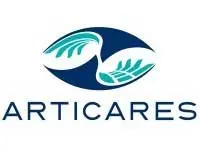2022/07/14
A Clinical Doctor's Explanation of Health Tech in Asia (Series#5)
The First Part: AI-Enabled Portable Arm Rehabilitation Robot, “H-MAN”
Medical communication, Clinical Doctor, Medical devices, AI (Machine Learning, Deep Learning), MSK (musculoskeletal), Non- Regulatory Affairs, Singapore
Developed by Articares to Decentralised Healthcare

According to the World Health Organization, rehabilitation is defined as “a set of interventions designed to optimize functioning and reduce disability in individuals with health conditions in interaction with their environment.” It is estimated that approximately one in three people worldwide will benefit from rehabilitation, with an estimated 2.4 billion people. The significant conditions requiring rehabilitation are, in order, musculoskeletal disorders, including chronic low back pain; sensory impairments, including hearing and vision loss; and neurological disorders, including stroke. However, supply and demand are said to be unbalanced, and in low- and middle-income countries, more than half of those who need rehabilitation do not benefit from it. Furthermore, it is believed that the opportunity to receive rehabilitation has been further reduced by the recent spread of the new coronavirus infection. Against this background, improving access to rehabilitation and reducing healthcare costs are important issues.
Traditionally, research on motor function, including rehabilitation, has been conducted in neurophysiology, cognitive science, and biomechanics. However, scientists have been entering the field in recent years, incorporating robotics technology, and developing digital tools in the rehabilitation domain. In particular, patients who cannot visit hospitals due to the coronavirus pandemic can continue rehabilitation in the comfort of their own homes by lending the machine, with the added benefit of digital tools in general that we can centralize the data at the hospital.

Articares Pte Ltd (hereafter, “Articares”), a Singapore-based start-up company, has developed “H-MAN”, a rehabilitation robot equipped with artificial intelligence (hereafter, “AI”), as a treatment device for the functional decline of the upper limbs following a stroke. It is said that 70% of stroke patients suffer from motor function loss, but it is generally more challenging to recover upper limb functions than lower limb functions. The “H-MAN” enables rehabilitation of the upper limb through a gamified environment in which the patient manipulates a mechanical robotic stick while engaging and playing different exergame scenarios displayed on a screen. Through these operations, the patient is able to benefit from a personalized training plan that is intensive with results that are clinically proven. Moreover, since the system is portable, patients can continue rehabilitation in the comfort of one's own homes. With built-in telerehabilitation capabilities within the “Care Platform”, clinicians and therapists are able to monitor the progress of their patients as well as create a personalized rehabilitation training program for them.

On March 23, 2022, Articares announced that the China National Medical Products Administration “NMPA” (equivalent to Japan's Pharmaceutical and Food Safety Bureau of the Ministry of Health, Labor and Welfare, or the FDA of the United States) had approved “H-MAN” as for a device for upper limb neurorehabilitation training. We can expect that the use of “H-MAN” in the vast market size of China will lead to rapid progress in clinical applications as a large amount of data is learned by AI.
On April 19, 2012, Articares also announced a strategic partnership with Life Science Robotics ApS (hereafter, “LSR”), a Denmark-based company promoting robots for lower limb rehabilitation. LSR is a company that promotes the use of robots for lower limb rehabilitation, and together with Articares's upper limb rehabilitation, the two companies hope to realize total care.

Center: Mr. Keld Thorsen, CEO of LSR,
Right: Mr. Matthias Gralki, National Account Manager, Germany of Articares
Source: Articares
The following article will introduce specific clinical results and prospects of “H-MAN” by carefully reading papers that have already been reported.
(Continue to the next)
【Source】
- World Health Organization (WHO), “Rehabilitation” 10 Nov 2021, https://www.who.int/news-room/fact-sheets/detail/rehabilitation
- Alarcos Cieza, PhD et al. “Global estimates of the need for rehabilitation based on the Global Burden of Disease study 2019: a systematic analysis for the Global Burden of Disease Study 2019” DOI:https://doi.org/10.1016/S0140-6736(20)32340-0, 01 Dec 2020, https://www.thelancet.com/journals/lancet/article/PIIS0140-6736(20)32340-0/fulltext
- Articares Website https://articares.com/
- Articares News “Articares announces China’s NMPA has approved the H-Man for upper limb neurorehabilitation training” 23 Mar 2022, https://articares.com/news-china-nmpa-approval-for-h-man/
- Articares News “Medical robot specialists Articares and Life Science Robotics ApS (LSR) announces their strategic partnership.” 19 Apr 2022, https://articares.com/news-articares-lsr-partnership/
【Aevice Health】

Articares is an international medical devices company with multiple offices in Europe and Asia. Articares’ mission is to bring quality rehabilitation within everyone’s reach. We achieve this by connecting healthcare professionals and patients through every step of the recovery journey, using advanced robotics and artificial intelligence solutions that empower people towards achieving a better quality of life and allow them to participate again in activities of daily living.
Our solutions are the results of intensive and collaborative work between experts in medical, business, and engineering fields. Articares’ products have been validated by clinical studies and made available to you by a team that strives to make every step of the recovery process a rewarding and life-changing journey.
The company is headquartered in Singapore with teams and partners in Australia, China, Germany, Italy, Switzerland, South Korea, Thailand and Pakistan.
Follow Articares on social media:
We have not received any rewards from the publishers for writing this manuscript.
The information contained in this article is compiled by the respective authors based on publicly available information. We assume no responsibility whatsoever for any damage or disadvantage caused by actions taken based on such information. Unauthorized reproduction of articles, photos, charts, etc. is prohibited.
Copyright © 2022 LSMIP office / CM Plus Corporation
A Series of Articles

